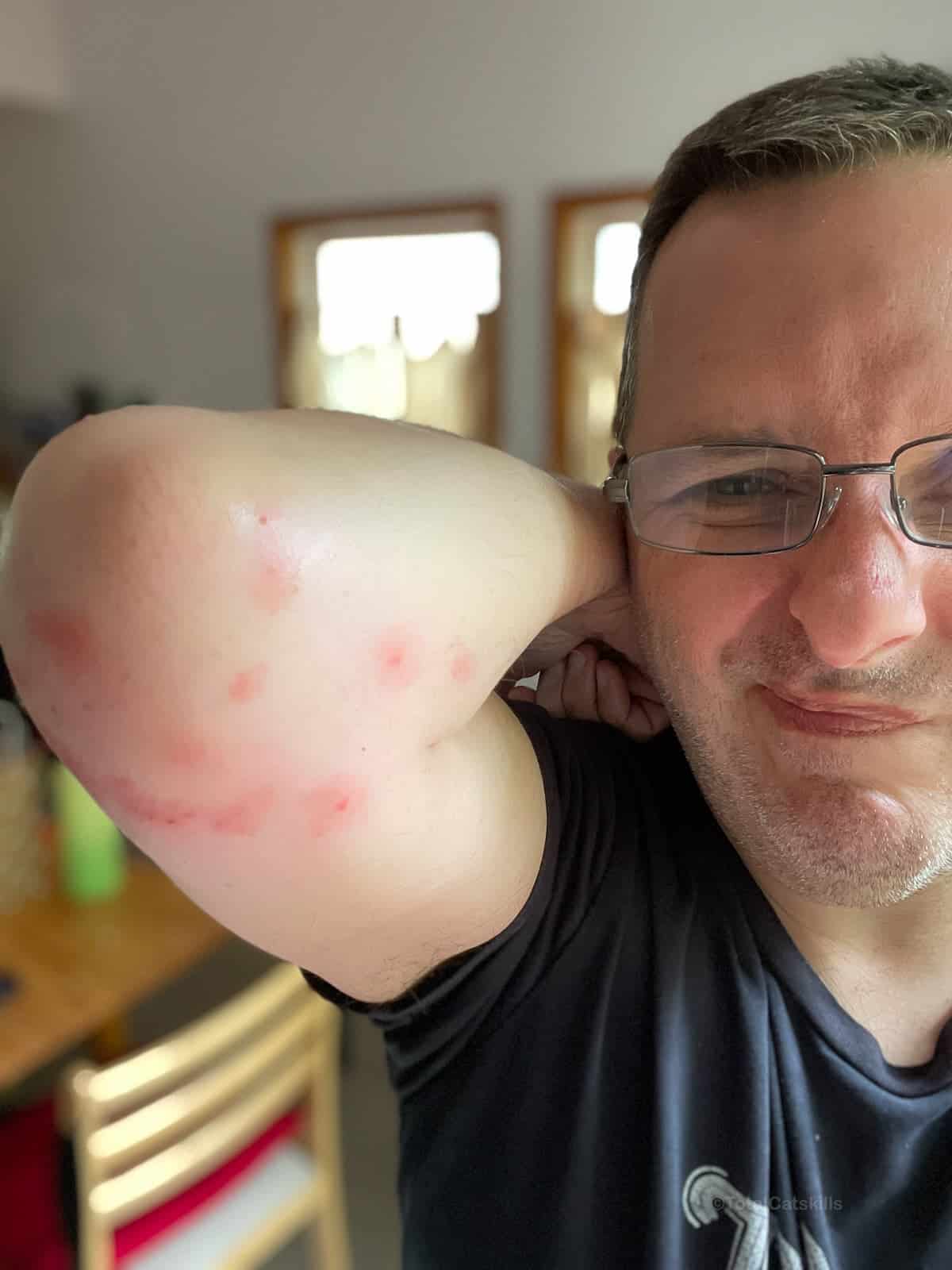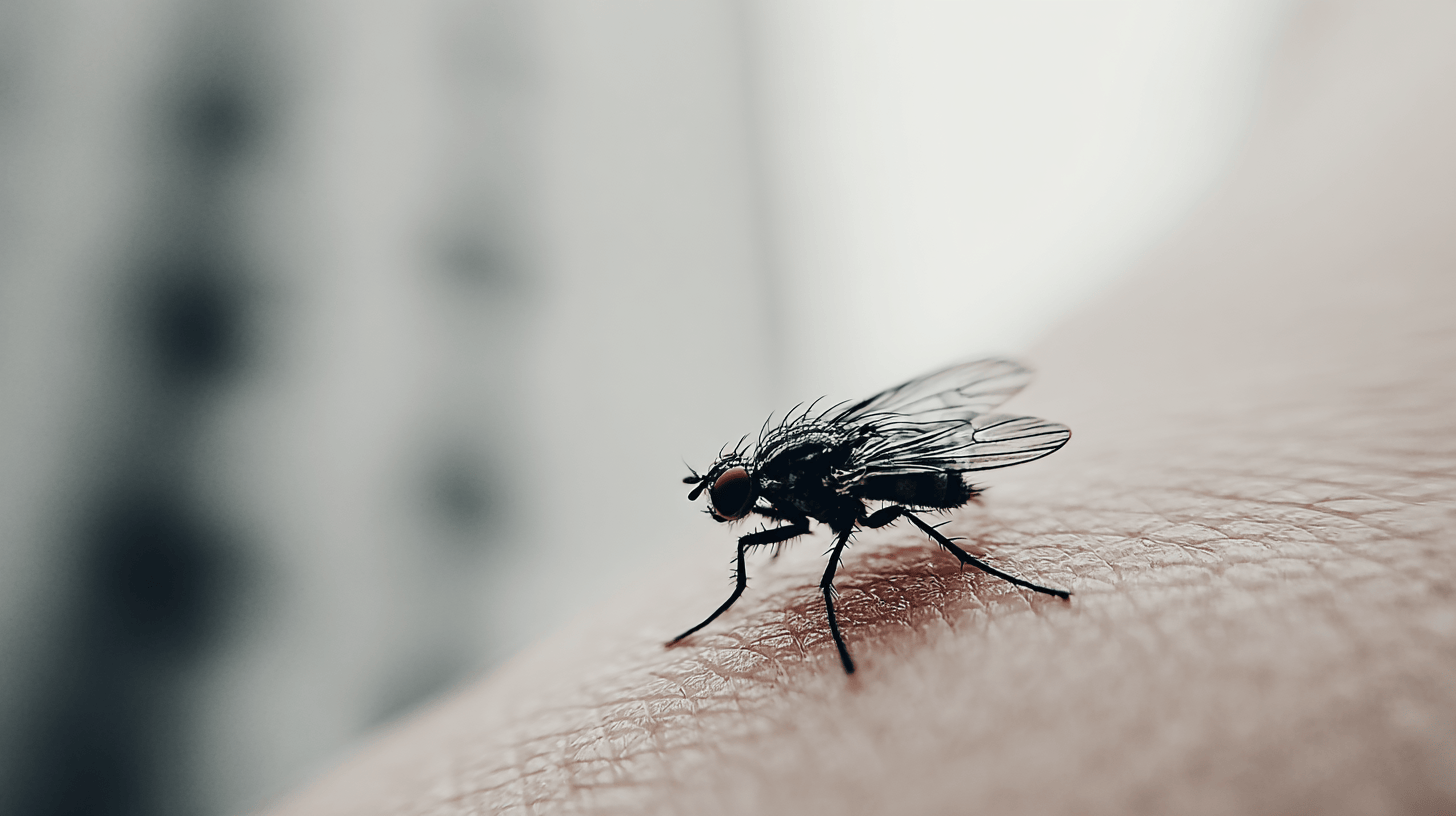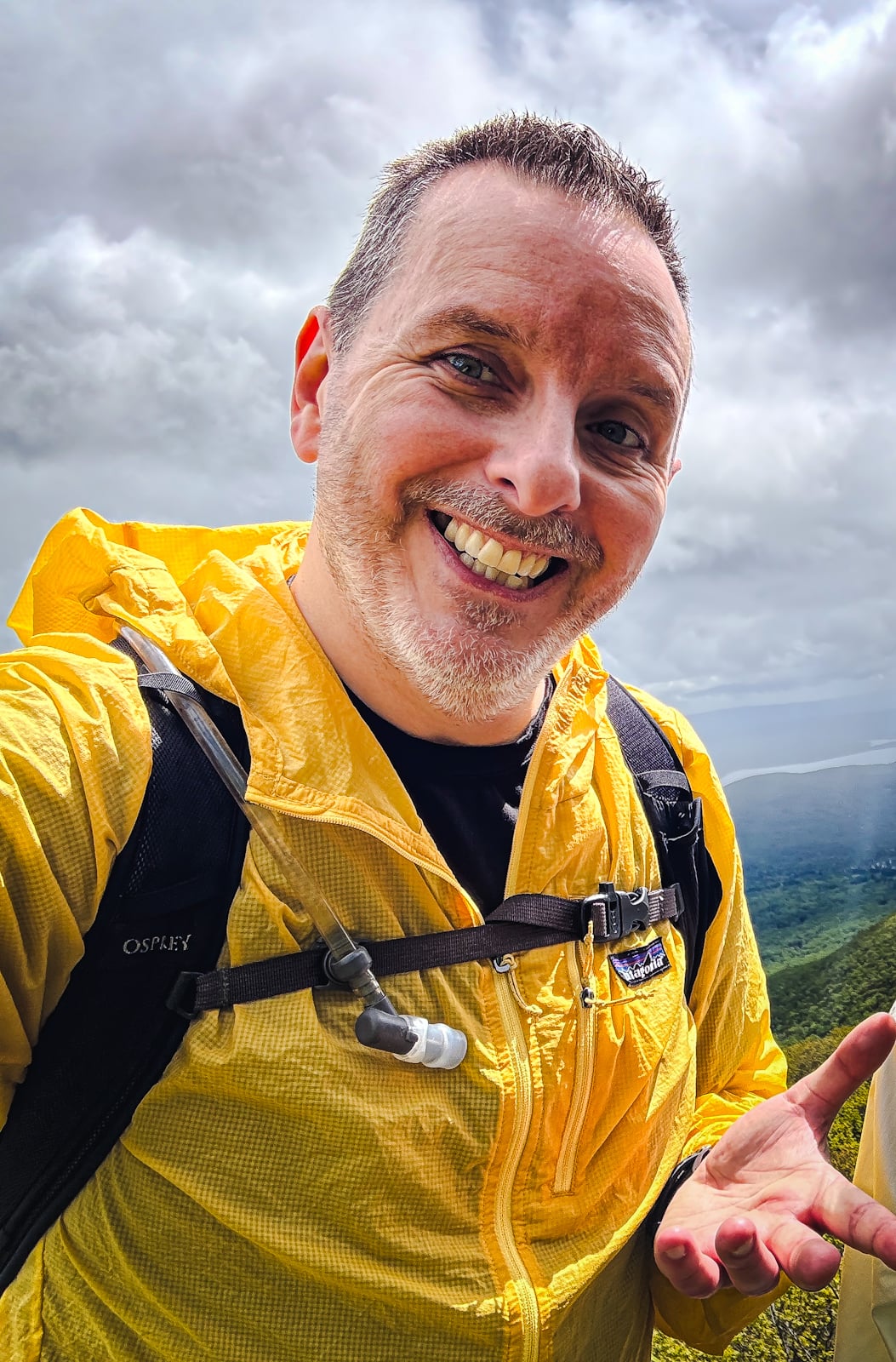Disclosure: This content may contain affiliate links. Read my disclosure policy.
Black fly season means black fly bites. Ugh! Here’s when to watch for black flies, how to avoid them, how to repel them, and how to treat their super-itchy bites.
Small and ferocious and intensely annoying, black files — also known as “buffalo gnats” and “turkey gnats” — are the bane of hikers and outdoorsy types in the northeast United States for several weeks each year.
As we gear up for another season of hiking, camping and outdoor activities, we need to prepare for one of our least welcome visitors: the black fly.
Black flies are small, blood-sucking insects, notorious for swarming around humans and animals alike, and enjoying us as fresh warm meal.
The sudden onset of warm weather this year has created an ideal environment for black flies to emerge and thrive. So as you lace up your hiking boots and pack your backpack, make sure you’re equipped with the right knowledge and tools to tackle black fly season head-on.
When is Black Fly Season?
In the Hudson Highlands, Catskills, and Adirondacks, peak black fly season is late May and early June — but the season starts earlier and can run longer.
I’ve heard people say the black fly season runs from Mother’s Day to Father’s Day, but that’s only a rough guide; Nature does not run on our schedule. 2023 is a perfect example.
Black flies usually start buzzing in The Catskills mid-May, and in the Adirondacks a little later.
However…
In 2023, after a mild winter and a very warm spring, everything in nature is way ahead of its usual schedule.
Adirondacks Versus Catskills
By May 1, there are already many, many complaints online about black flies in the Adirondacks, and black flies are making an early appearance in the Catskills too.
They’re here, and it could be a bumper year.
The Adirondack black fly season is always particularly insane. Down in the Catskills, it’s never quite as bad. Some regular Adirondack hikers switch to the Catskills for the duration of black fly season.
Get access to hyper-detailed trail guides, insider tips, and expert advice. Join a vibrant community of like-minded hikers, receive exclusive content, and embark on unforgettable outdoor adventures. Whether you’re a seasoned outdoor enthusiast or just starting out on your hiking journey, this website provides invaluable resources to help you explore the best trails in the Catskills, Adirondacks, Hudson Highlands, Berkshires, and beyond. Get access now to all content on this website instantly and enjoy unique supporter benefits.
BTW, you might also enjoy…
- NEW › Winter Skincare for Hikers
- CATSKILLS › Best Catskills Waterfalls
- STAY › Find Your Perfect Catskills Stay
- ADIRONDACKS › Hike Van Hovenberg
- ENTERTAINMENT › Best & Worst Hiking Movies
- Follow › My Instagram @TotalCatskills
- Follow › My Substack @TotalCatskills
- Follow › My writing for Times Union
Where Are The Black Flies Buzzing?
Black flies love the same places that mountain hikers love: forests and streams.
Black flies are most often found near streams — which includes a lot of the Catskills, and basically all of the Adirondacks.
Females lay their eggs exclusively in running water. Black fly eggs hatch underwater and the larvae attach themselves to rocks. After pupating underwater, the flies hatch and ride to the surface on a bubble of air before flying away.
The further you can get from water, the better. (Good luck with that.)
- Simuliidae — wikipedia black flat article
- Purdue black fly article
Black Fly Life Cycle
To better understand how to handle these pesky insects, it’s useful to know a little about their life cycle. Black flies undergo a complete metamorphosis. It consists of four stages: egg, larva, pupa, and adult.
- Egg: Female black flies lay their eggs on or near water, typically attaching them to submerged vegetation, rocks, or other surfaces. They lay hundreds of eggs at a time and, under the right conditions, they can hatch in a matter of days.
- Larva: Once hatched, the larvae attach themselves to submerged objects using tiny hooks on their bodies. They are filter feeders, consuming organic material and tiny organisms from the water. This stage can last anywhere from two weeks to a few months, depending on the water temperature and available food sources.
- Pupa: After the larval stage, black flies enter the pupal stage, where they remain attached to their underwater habitat, encased in a cocoon-like structure. This stage typically lasts about a week, during which the insects undergo a transformation, developing wings and other adult features.
- Adult: The fully formed adult black flies emerge from their pupal cases, typically in the morning or evening, and make their way to the water’s surface. Once they’ve dried their wings, they take to the air in search of a blood meal. Adult black flies have a short life span, typically lasting only two to three weeks.
Black Fly Bites
Black flies will most often bite your head, neck and face — but any exposed skin is a target.
If you wear a teeshirt and forget to apply bug repellent to the backs of your arms, that’s exactly where they’ll getcha. I learned the hard way…

And if you wear shorts in black fly season, you crazy!
Black flies cut a small hole in your skin with their disgusting fly mouthparts, and then use disgusting fly anticoagulant, awful histamines and gross enzymes to make sure your blood stays flowing.
Your body does not love being a fly restaurant.
Thankfully, in the USA at least, black flies don’t transmit serious disease to humans. And, for most people, black fly bites are fairly painless.
Black Fly Fever
However, if you’re unlucky enough to be allergic to black fly bites, the reaction can be quite intense. Bites can swell to the size of a golf ball and be very painful.
You may also experience “black fly fever” which can include headache, nausea, fever and swollen lymph nodes in the neck.
How Long do Black Fly Bites Last?
You probably won’t notice the bites themselves on the trail. I never notice them until they start itching later. And they will itch. Oh, how they will iiiiiitch. It really is the worst.
For me, the itching intensifies over time. For me, the itchiness seems to peak about 48 hours after I’ve been bitten.
Google “after-bite-anti-itch-gels” which look interesting and get good reviews; I haven’t tried them yet. Prevention is your best bet.
BTW, if you pick up enough bites and the scabs form just right, you can do an excellent impression of a plague victim.
Black Fly Bite Treatment
I carry some alcohol swabs as part of my basic hiking kit on every hike. They’re pretty great for cleaning up and soothing minor injuries like nettle stings and black fly bites.
Washing the area with soap and water will also reduce the risk of infection. After washing with soap and water, apply basic topical treatments…
- Cooling with ice
- Calamine lotion
- Aloe vera
- Antihistamines, either in tablet form or as topical ointment
- Hydrocortisone anti-itch cream
- Vinegar
- Witch Hazel
The above remedies are pretty good. But you will still get itchy. Try not to scratch. Scratching increases the risk of infection.
You will not be able to not scratch.
But do try to not scratch.
Black Fly Bite Prevention
Here are your ten best prevention options…
- Don’t hike during black fly season — as an option, this sucks, but many people significantly dial down their hiking plans during black fly season;
- Wear light-colored clothing — black flies love dark colors;
- Wear long-sleeved tees and full-length hiking pants;
- Apply a bug repellent like Off! to your clothes, and/or the more natural Repel which you can apply directly to your skin — some people swear by Nantucket Spider and they have Natural Bug Repellent that gets very high ratings online;
- Keep moving — black flies are dumb and slow, and not very good at tracking their target, so you can reduce the number of dive bombs considerably by just powering right ahead;
- Hike on breezy days — black flies are weak fliers and even a light breeze helps keep them away, while mixing your expelled carbon dioxide with the air, making you harder to track;
- Hike during the middle of the day — black flies don’t love the bright afternoon sun and lower humidity, preferring to move around after dawn and for an hour or two before sunset;
- Enjoy open areas — large ponds and lakes included — black files prefer woods and flowing streams;
- Don’t hike on especially muggy days — what we hate, they love / black flies love humid weather, it’s their absolute jam;
- Wear a head net — keep flies and mosquitos off your entire head and neck — if you hit the Adirondacks during black fly season without a head net, you really are crazy.
As you venture into the great outdoors this season, arm yourself with the proper protective gear, insect repellents, and the knowledge to make your outdoor adventures as enjoyable and fly-free as possible.
Get access to hyper-detailed trail guides, insider tips, and expert advice. Join a vibrant community of like-minded hikers, receive exclusive content, and embark on unforgettable outdoor adventures. Whether you’re a seasoned outdoor enthusiast or just starting out on your hiking journey, this website provides invaluable resources to help you explore the best trails in the Catskills, Adirondacks, Hudson Highlands, Berkshires, and beyond. Get access now to all content on this website instantly and enjoy unique supporter benefits.
BTW, you might also enjoy this post about tick prevention during tick season.
Happy trails!
Frequently Asked Questions About Black Flies
What do black flies look like?
Black flies are small, dark-colored insects with a humpbacked appearance. They are typically 1-5mm in length and have a stout body, short legs, and broad wings.
Do black flies transmit diseases?
While black flies can be a significant nuisance, they are not known to transmit any diseases to humans in North America. However, in some regions of the world, they can spread a parasitic disease called river blindness (onchocerciasis).
How can I prevent black fly bites?
To prevent black fly bites, wear light-colored, long-sleeved shirts and long pants, as well as a hat with a bug net. Apply insect repellent containing DEET, picaridin, or other effective ingredients to exposed skin and clothing. Avoid being outdoors during peak black fly activity, which typically occurs during the morning and evening hours.
How can I treat black fly bites?
To treat black fly bites, clean the affected area with soap and water. Apply a cold compress, hydrocortisone cream, or calamine lotion to reduce itching and swelling. Avoid scratching the bites, as this can lead to infection.
Are black flies attracted to certain colors or scents?
Black flies are attracted to dark colors, so wearing light-colored clothing can help make you less noticeable to them. They are also drawn to carbon dioxide and odors from sweat, which is why they tend to swarm around the head and face.
How can I control black flies around my property?
Controlling black flies can be challenging, as their larvae develop in running water. Reducing breeding sites, like clearing vegetation from the edges of streams, can help. However, large-scale control measures often require coordination with local authorities and the use of environmentally safe larvicides.
Why do black flies seem to be more aggressive than other biting insects?
Black flies are persistent and aggressive in their search for a blood meal, which can make them seem more bothersome than other biting insects. Their bites can be painful and cause severe itching, swelling, and sometimes even allergic reactions.
Do black flies bite animals, too?
Yes, absolutely, black flies feed on the blood of various animals, including mammals, birds, and reptiles. They can cause discomfort and stress to livestock and wildlife, and in some cases, transmit diseases to animals as well.
Remember that being well-informed about black flies and taking the necessary precautions can help you enjoy your outdoor adventures with fewer annoyances from these persistent insects.
The One Good Thing About Black Flies is…
Black flies love clean, healthy, pollution-free streams.
It’s actually a sign of good environmental health that we have robust populations of black flies in our national park lands. We’re doing great! Ewww!
Literally everything else about them… Yeah, no.
Read More
Get full access…
Get instant access to the full version of this site and enjoy great supporter benefits: full galleries, full trail notes, early access to the latest content, and more.
Hot on the website right now…
Follow for more…
Follow my @TotalCatskills content on Instagram for regular hiking inspo and safe, inclusive community.



